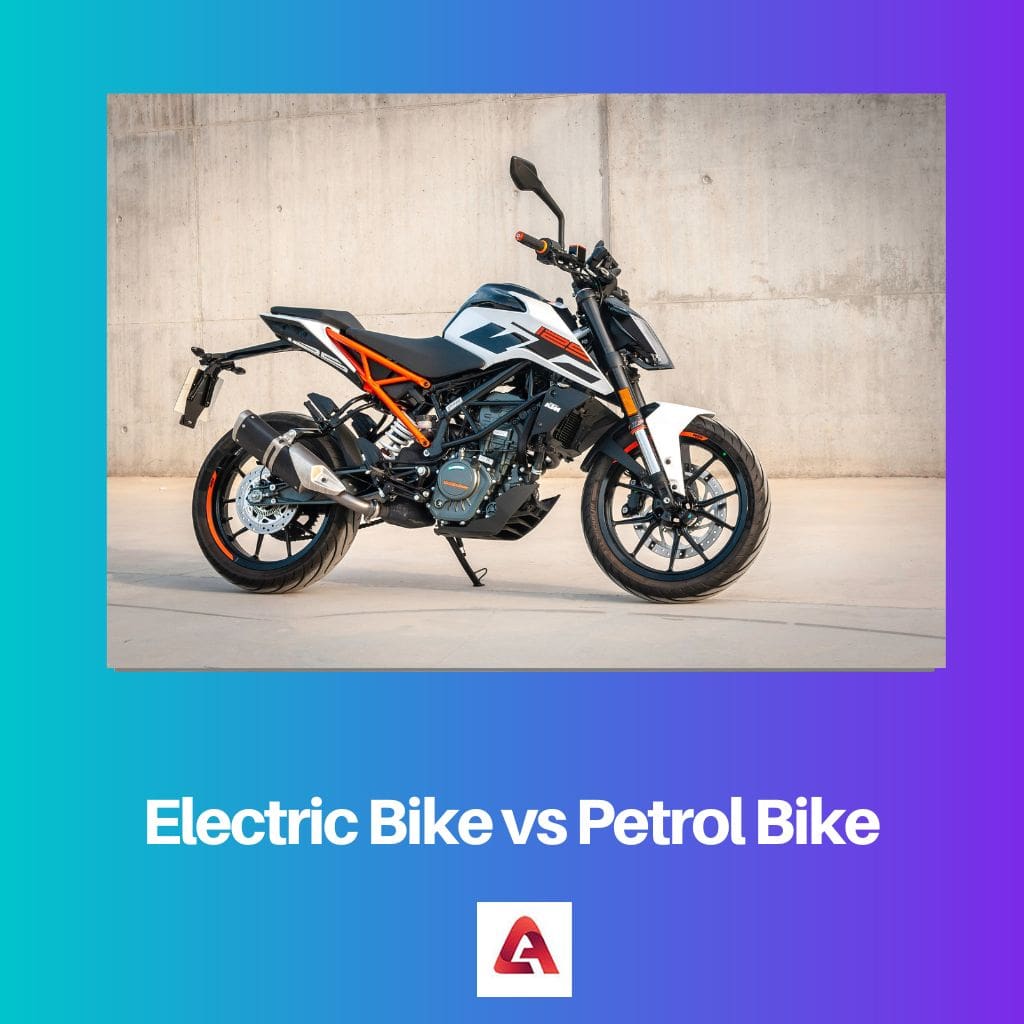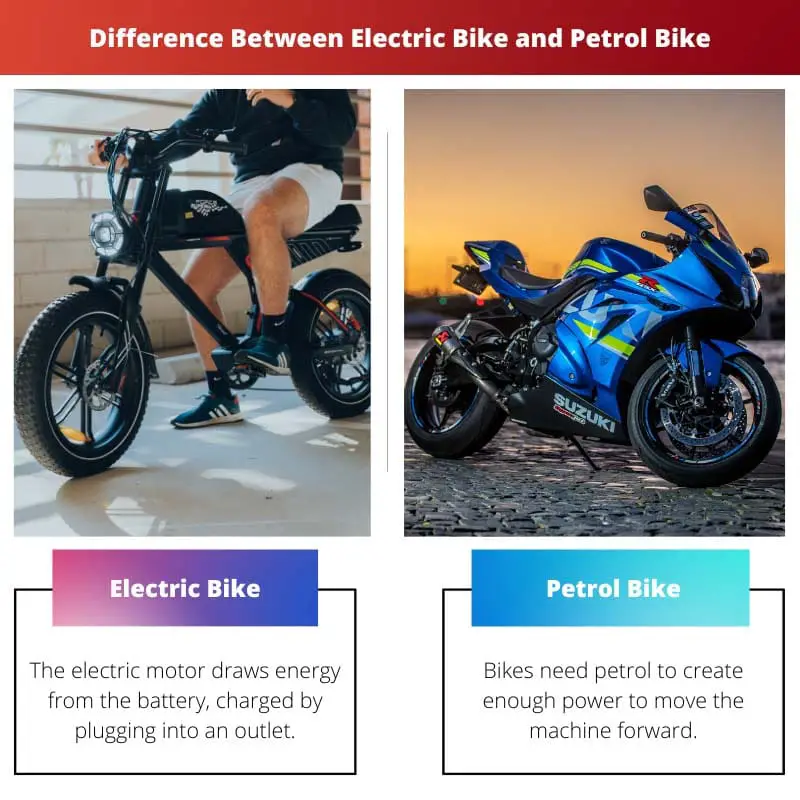Two-wheeler technology has come a long way in the last few years. Customers now have several options, including electric models that were recently introduced.
While non-carbon-based fuels represent the future, the technology has not yet reached its full potential. Until recently, bike could only use petrol as a fuel source.
Electric and gasoline bike are currently available to customers.
Key Takeaways
- Electric bikes use electric motors for propulsion, while petrol bikes rely on internal combustion engines.
- Electric bikes produce zero tailpipe emissions, making them more environmentally friendly than petrol bikes.
- Petrol bikes have a longer range and higher top speeds than electric bikes but require more maintenance and fuel costs.
Electric Bike vs Petrol Bike
An electric bike, is a bicycle that is powered by an electric motor. It uses rechargeable batteries to power the motor and can be pedaled like a regular bike. A petrol bike is a motorcycle that runs on petrol as fuel. A petrol bike uses petrol as the fuel source to power the bike.

A petrol bike is a vehicle with an internal combustion engine that runs on petrol. It requires regular maintenance and the replacement of worn-out mechanical components, and it gets around 50-60 kilometers per liter.
Carbon dioxide gas (CO2) is emitted by petrol bikes, which highly damages the environment and pollutes it.
The electric motor and battery pack in an EV are similar to the engine and gas tank in a conventional car.
In general, the batteries take up as much room as the gasoline engine did, and the electric motor sits where the transmission used to be—the battery pack powers a large electric motor that turns the wheels.
The amount of power (or torque) your electric motor produces plays a significant role in how quickly your vehicle accelerates from 0 to 60 mph.
Comparison Table
| Parameters of Comparison | Electric Bike | Petrol Bike |
|---|---|---|
| Charging/Fuelling | A complete charge of an electric bike will take at least two hours. | It’s a lot easier to fill up a gas bike. The trip to the gas station is simply a few minutes. |
| Subsidies by government | Electric bikes get subsidies from the government. | Petrol bikes do not get subsidies from the government. |
| Range | Electric bike now range from 80-100 kilometers, making them a decent alternative for short daily journeys. | Because there are petrol stations all across the nation, a petrol bike’s range is essentially endless. |
| Maintenance | Aside from charging the battery regularly, electric bikes require virtually little maintenance. | Petrol bikes require additional maintenance since they must be serviced regularly. |
| Environment | When compared to a petrol bike, an electric bike produces less pollution. | A petrol bike pollutes the environment more than an electric bike. |
| Fuel cost | Electric bikes have a lower fuel cost than petrol bikes. | A petrol bike has a more significant fuel cost when compared to an electric bike. |
What is Electric Bike?
The electric motor draws energy from the battery, charged by plugging into an outlet. The electricity is used to power the electric motor, which turns a reduction gear that drives the car’s wheels.
In a sense, all cars are electric cars. Gasoline-powered vehicles have internal combustion engines that burn fuel and use that energy to turn mechanical parts, generating the power needed to move the car.
Electric cars are very similar, except that an electric motor replaces the internal combustion engine.
The power for that motor comes from a big bank of batteries (called a traction battery pack), which must be recharged by plugging into an electrical outlet or charging station.
While there are several hybrid cars on the market today, hybrids are not what most people think of when they talk about “electric” cars.
Hybrids still use gasoline as their primary fuel source and have an electric motor and battery pack that can provide supplemental power for short distances.
Electric bike don’t emit greenhouse gases or pollutants such as carbon monoxide (from engines) or sulfur dioxide (from tailpipes) harmful to human health.
And they’re becoming much more affordable; an increasingly large number of models are coming onto the market as government incentives make EVs less expensive to buy.

What is Petrol Bike?
Bikes need petrol to create enough power to move the machine forward. This petrol is ignited by the spark plug, which expands the gas and causes the piston to rise, fall owing to the crankshaft, and so on.
This process creates a pull of energy that allows the bike to go forward. The overall amount of energy produced depends on how much petrol is being used.
The more petrol supplied, the more air that gets mixed with it, and thus the more energy that can be produced. For example, when you twist your throttle a quarter turn or more, you allow more petrol into your engine.
This gives you an additional burst of acceleration.
Two-stroke engines fire every crank revolution, while four-stroke engines fire once every other revolution.
In addition to this difference in firing intervals, two-stroke engines also have the advantage of being essentially lighter in construction than a four-stroke engine of equivalent power;
and they inherently produce more power for a given engine displacement than a four-stroke.

Main Differences Between Electric Bike and Petrol Bike
- Electric bikes require very minimal maintenance other than charging the battery regularly. On the other hand, Petrol bikes need more excellent care because they must be serviced regularly.
- Government subsidies are available for electric bikes; however, government subsidies are not available for gasoline bikes.
- An electric bike creates less pollution than a petrol bike, but a petrol bike pollutes the environment more than an electric bike.
- Electric motorcycles have a lower fuel cost than petrol bikes, whereas petrol bikes have a higher fuel cost.
- An electric bike will take at least two hours to charge fully. On the other hand, a gas bike is much easier to fill up. It only takes a few minutes to go to the gas station.
- Electric bike currently have a range of 80-100 kilometers, making them a viable alternative for short daily commutes. In contrast, a petrol bike’s range is limitless due to the abundance of gas stations around the country.

- https://www.sciencedirect.com/science/article/pii/S0378775307010294
- https://link.springer.com/article/10.1007/s11116-007-9118-8
